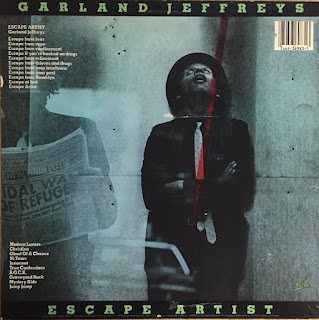Garland Jeffreys is a singer-songwriter of mixed-ethnic heritage from Brooklyn, born in 1943. He was a contemporary of Lou Reed and Felix Cavaliere of the Rascals as a student at Stanford University in the early 1960s.
Jeffreys was one of those guys in the 1970s who was loved by critics in the music press but never really got a foothold commercially. He released seven albums between 1973 and 1983, and has surfaced a handful of times since. He released an LP as recently as 2017 and spent some time touring with Little Steven and the Disciples of Soul before he retired in 2019.
He began his career after college singing in clubs and coffeehouses around the city and first appeared on record playing guitar and writing one song on John Cale's 1969 solo debut, Vintage Violence.
Jeffreys formed a band called Grinder's Switch, which recorded an LP in 1969. He eventually got a contract as a solo artist from Atlantic Records and released his self-titled debut in 1973. He released a non-album single that year titled "Wild in the Streets." The single went nowhere but did get some FM radio play when it was rereleased in 1977 and landed on his second solo album, Ghost Writer.
Escape Artist was Jeffreys' fifth solo album, released in 1981 by Epic Records. The album was produced by Bob Clearmountain, a longtime producer with some big acts over the years. Escape Artist was one of Clearmountain's first records. He went on to work with people like Bruce Springsteen, the Rolling Stones, Bryan Adams, David Bowie, Paul McCartney, Hall & Oates.
Escape Artist in its original form was a 10-track album recorded in New York. The LP was packaged with a four-track, 15-minute EP titled Escapades, which consisted of a couple of outtakes from the Escape Artist sessions as well as two reggae tracks recorded in London and produced by Dennis Bovell.
The album now appears on the streaming services with the four EP tracks tacked on at the end.
As it turned out, Escape Artist was the best-selling album of Jeffreys' career. It did reach No. 59 on the Billboard 200, by far the best showing for any Garland Jeffreys album.
Jeffreys and Clearmountain assembled quite an impressive roster of session musicians for this album. G.E. Smith, who was the musical director for Saturday Night Live for a time; Danny Federici and Roy Bittan of the E Street Band; synthesizer wizard Larry Fast; Adrian Belew is on here; the Brecker Brothers. Andrew Bodnar and Steve Goulding from The Rumor, Graham Parker's longtime backing band, are here. Lou Reed, David Johanson, Nona Henryx among others provide some backing vocals.
As a sidenote, The Rumor was Jeffreys' backing band on his tour in support of this album -- including longtime Parker sideman Brinsley Schwartz on lead guitar.
As you can probably guess from the appearance of all these names in the liner notes, this is a well-crafted and brilliantly produced album. This was the pinnacle of Jeffreys' recording career. I have listened to several of Jeffreys' albums over the years, especially the ones released in the 1970s, and this is one is my go-to.
Jeffreys was a pretty good songwriter. His lyrics were mostly of a personal nature, dealing with the things that touched his heart. From that, a lot of his songs dealt with the racism he felt victimized by as a mixed-race kid growing up in Brooklyn. He does hit that pretty hard in a couple of songs here -- particularly in "Miami Beach," a track from the EP recorded in London that deals with a nasty race riot in Miami in 1980 that happened after four white cops were found not guilty of beating a black man to death during a traffic stop.
Several of the songs on Escape Artist are noticeabley reggae-influenced. But for the most part, it is a rock record, performed masterfully by a bunch of people who knew how to rock a pub.
The lead track, "Modern Lovers," kicks things off nicely, and the quality stays pretty high throughout.
Definitely the highlight of the album is the fourth track, a pretty faithful cover of the garage-rock classic "96 Tears," which was a chart-topping single by ? and the Mysterians in 1966. Jeffreys and the band knock this one out of the park. They stay extremely close to the original on here. If you heard this track on the radio and knew nothing about it, you could easily mistake this as basically a cleaned-up, remastered take on the original recording. We're not sure who of the session musicians appear on this track, as the credits aren't listed track-by-track. But whoever is on this track nails it, and Jeffreys nails the vocal.
It is the only one of the 14 tracks here not written by Jeffreys. He includes it here as one of his favorite songs from his youth, and one that inspired him become a musician. It fits in nicely with the rest of the album.



No comments:
Post a Comment
Spammers will not be tolerated. You casino scammers will be reported immediately and your comments deleted.